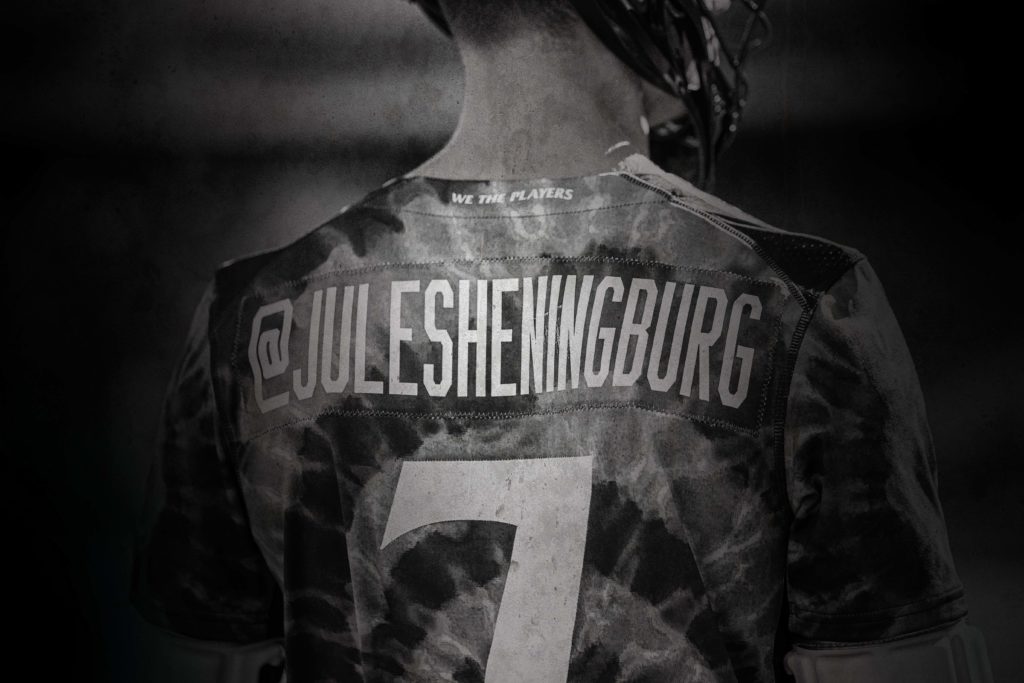
- 05.30.20
Standing At The Crossroads
A message from Epoch Athlete Jules Heningburg
- Epoch Author
- May 30, 2020
- 1:00 pm
- No Comments
I was born in Maplewood, NJ, a diverse township outside of New York City. My dad is Black, my mom is white. I have 3 siblings by blood, 2 adopted Black brothers.
My paternal grandfather, Gus Heningburg Sr., was a prominent figure during the Civil Rights Movement, advancing desegregation and labor equality efforts across the state of NJ and beyond. As a result, my dad, Gus Heningburg Jr., was often a target of racial discrimination.
The stories of my Grandfather’s journey and how it shaped my Father’s childhood would become the narrative that would shape my future. 2001 was my earliest memory of my Dad communicating what it meant to be black.
My Dad had a front seat to the racial tensions and realities that existed in America in the 60’s. He witnessed crosses being burned, animals being tortured, what we read about in text books, he saw first hand. So, he believed it was important to be candid and empower us to have pride in our identity even in the shadows of societal doubt. He wanted to protect us.
We would often be reminded that we must navigate the world through a different lense, as sometimes Black men do not make it home at night. As a young boy, I did not fully understand what that meant.
I did know that my Dad required me to disclose where I was going, who I was with and would make sure we made it home safely every night. He was at peace when we were in our beds, under his roof. Back then, again, I did not understand. Dad, he was just being annoying, overprotective.
He cautioned dating as it took away from the focus on my studies and athletics. But it was more than just guiding me to make smart decisions and sacrifices, he was concerned I would be faced with dating a girl from a family that may not accept me.
He was trying to protect me from potentially getting hurt. Not just emotionally, but physically too. He would remind me and my brothers to make sure to “Call me if you ever get caught up with the police.”
I would always have to be “twice as good to get half the credit” – I understood privilege early on. Growing up mixed race in Maplewood was better than other places. However, sometimes I wonder if it had anything to do with growing up in a town where my Dad had the privilege of generational connections to the municipalities. In many ways, I was protected by a different kind of privilege.
You are never white enough to be accepted by white people and never black enough to be accepted by black people, entirely. That is the reality I dealt with my entire life. My light skin, wavy brown hair could go either way. The question, “what are you” would be asked often. How are you supposed to respond to that? I am an American, born and raised.
Sports continued to bring light to the divide. It made me question my identity. From an early age, I remember feeling like the odd ball out, needing to somehow validate my Blackness.
When I started playing lacrosse in my local youth program in elementary school, my world changed. My teammates weren’t from my side of town, also known as Maplehood. None of my close friends from my neighborhood was on the team, none of my basketball teammates were playing. It felt off, even at that point, and put a chip on my shoulder.
Due to my fair skin, though, I was able to assimilate relatively quickly. Other friends who were Black often never had that privilege. Every lacrosse team they joined and field they stepped on, they stood out significantly.
At 14, I remember vividly being with my family when the Trayvon Martin story first hit the media cycle. It was the first time my dad’s lessons and warnings over the years came full circle and really clicked for me. Seeing it on video, outside of our diverse bubble of Maplewood, made it real. Social media heightened my awareness, realizing how privileges I’ve been afforded have allowed certain racial issues to not fully impact my reality, which is why I decided to share my truth today.
Even within my own family, my siblings have had varying experiences with race, each of us navigating that in a unique way all under the same household. I recognized the crossroads I stood in from a young age. I did my best to speak up and be a leader for the Black community, because it was my community, despite not always feeling accepted by it. Nor did I feel fully accepted by a dominantly-white lacrosse community due to my race & socio-economic situation. This has been a difficult challenge to overcome.
It was confusing to say the least, and navigating it was tricky. One thing for certain is it has given me immense perspective.
There were certain defining moments over the years where I realized the potential my circumstances gave me. Due to my light skin, I think there were levels of trust and comfort I got with my peers within the lacrosse community, specifically in locker rooms that I have been in, that someone of a darker tone may not necessarily get. It was at the least, not as top of mind amongst my teammates. It allowed me to speak up and explain things and share perspective in a way many of my teammates hadn’t heard before. Perhaps subconsciously, I recognized my experience would allow me to bridge the gap for that conversation in our sport.
George Floyd could have been one of my brothers, my Dad, a Black friend or teammate. It breaks my heart to also recognize it very likely would never be me. If my skin was a few shades darker, life would be much different. This is a privilege that requires a responsibility to speak up.
The demographics in the sport of lacrosse is no secret. People in our sport, and beyond, love to emulate and relish in black culture; music, dance food, clothing, language, and that is a shared experience we can all have. However, when it’s time to be empathetic to the injustices black people feel and that shared agony, suddenly it is not convenient. It’s not acceptable to love our culture but not show love to those same human beings in times of need.
While there’s plenty of work to be done, I am excited with change on the ground now and the change I anticipate to see in coming years.
I challenge those reading this to acknowledge our black friends and family, in the sport and out, near and far, for what they are feeling during times like this.
Scared, angry, oppressed.
This is not out of nowhere. It should not be ignored or marginalized. It is real and it is affecting us. I challenge you to empathize with your fellow people and recognize our shared human experience. We are all connected; when one group is experiencing this, we all are.
And to the young Black players out there listening to this: You are not alone.
I may not be as “Black” as you, but I stand with you, for you. I am your ally more than you may have known before reading this. My words may not heal your pain, but I hope it may provide a spark to keep moving forward and overcoming the obstacles we face. While headlines may suggest otherwise, know this: you are human, you are valued, and you are living a life worth living.
Although it may not always seem so, I assure you that this sport is for you. Don’t let stereotypes impact your own truth. If it is something you want and something you are willing to work for, there is no limit to the success you can have in this sport, and in life. You can elevate to the top level and you have brothers-in-arms already in this league who will help guide you along the way.
Stay strong, stay proud, stay black and keep loving.
Your brother in the game, Jules.







